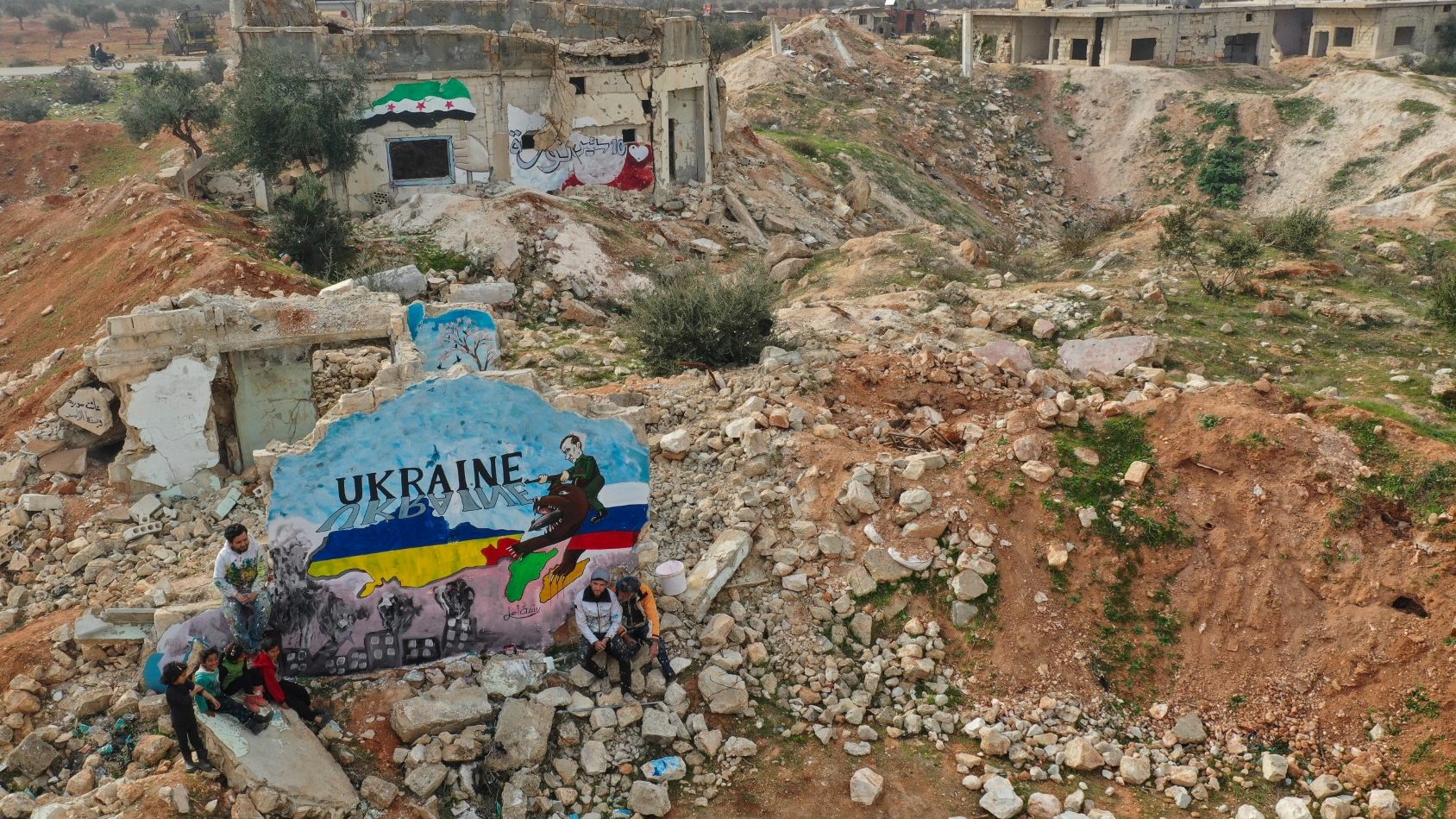Silence rules unchallenged over the Independence Square in Kyiv. Many of the city’s residents have taken refuge in the various bunkers and metro stations near them, as the threat of Russian strikes over the Ukrainian capital mounts. Although they seem worlds apart, today, the cities of Ukraine and Syria have much in common. Not only because innocent citizens in both cities live in fear of Russian jets, but also because what happens in Ukraine is deeply linked to power dynamics in Syria.
Sam Hamad, a writer, and History Ph.D. candidate at the University of Glasgow, focusing on totalitarian ideologies, had argued in an op-ed for the pan-Arab website Asharq al-Awsat, that the world is paying in Ukraine the price of giving up on Syria. He compared the 2013 deal between Russia and the U.S. on Syria, which led to the latter disengaging gradually from the conflict, to the Munich agreement between Hitler and then UK prime minister Chamberlain. The agreement, that subdues Czechoslavakia to the German dictator, was seen by western European powers as a means to appease Hitler. Years later, he invaded Poland and triggered World War 2. Similarly, giving Syria to Putin, Sam Hamad claimed, did not appease the Kremlin. It only made him hungry for more.
Unipolar order
And in fact, the Syrian opposition coalition media department has quickly published a statement by the secretary-general of the coalition Haitham Rahma, after Vladimir Putin recognized the independence of breakaway regions in Eastern Ukraine and sent troops there to supposedly “maintain the peace”. Rahma called this decision “thuggery” and said, “Putin either occupies this country, displaces its people and seizes its resources, or he tears it up into separatist cantons and follows through with unilateral decrees recognizing them as popular republics.”
The position among regime circles was, as is expected, quite different. In fact, Syria directly backed Russia’s decision to recognize the independence of the republics of Luhansk and Donetsk, expressing its readiness to cooperate with the separatists of eastern Ukraine, according to the official agency SANA. In the past, Syria had also enthusiastically interacted with breakaway regions supported by Moscow, like Abkhazia or Crimea.
Furthermore, the Deputy Minister of Foreign Affairs and Expatriates Bashar al-Jaafari has claimed that the Ukraine crisis concerns Syria, as it will determine whether the U.S. can impose a unipolar world order, according to the pro-government newspaper The Syria Times.
Like several other regime officials, he insisted that it is NATO who triggered the crisis by threatening Russian national security.
Israel, on the other hand, worries that the Ukraine crisis would directly affect its position in Syria. Israeli officials are worried that sanctions on Russia would hinder the cooperation between the two countries in Syria, according to the opposition website SY-24. The quotes officials said that the United States has long been a stable ally, but Tel Aviv “needs Russia due to the circumstances in the Middle East.” In the past, Russia has given Israel powers on the Syrian scene to carry out airstrikes on sites it says are Iranian.
As for Turkey, the Qatari international news website al-Jazeera has reported that Ukraine has asked Ankara to close the Bosphorus and Dardanelles straits to Russian ships, putting the president of the NATO country in a difficult position. If president Erdogan was to agree to the Ukrainian request, he would jeopardize the cooperation between Russia and Turkey in Northern Syria. Ankara which backs the Syrian opposition in the northwest, and Russia which backs the regime, hold frequent talks to avoid escalation and are negotiating a way out of the Syrian crisis in the Astana platform.
Could the Ukrainian crisis change the political scene in Syria? The Syrian government-affiliated al-Baath newspaper had affirmed that the U.S. is considering a Syria-in-exchange-of-Ukraine strategy, which president Putin rejected. A few days later, Assad was praising the strategic importance of the Hemeimeem military base in western Syria, while meeting the Russian defense minister at the Bassel al-Assad airport.


